Why Were the Police Held Back in Charlottesville?

Charlottesville is now a by-word for political violence.
As you’ve probably heard, the Virginia college town played host to an alt-right rally that descended into violence on Saturday. Both the white nationalists and left-wing counter-protesters fought and beat each other with blunt objects for most of the morning.
The violence eventually led to deadly proportions when one of the alt-right rallygoers plowed into a crowd of counter-protesters, killing one woman and injuring several others. (Two officers monitoring the rally in a helicopter also died when their chopper crashed later that day. That tragedy appears to be the result of an accident.)
The sheer violence and extremism on display in Charlottesville shocked the nation, and politicians all over the spectrum issued strong condemnations of the rally.
Foremost among them were Democratic Virginia Gov. Terry McAuliffe and Democratic Charlottesville Mayor Mike Signer.
McAuliffe issued a strong denunciation of the alt-right and the rally violence on Saturday, telling white nationalists there was “no place for you in America.”
Signer sought to place the blame for the alt-right rally on President Trump, declaring that the supposed empowerment of racism “goes right to the doorstep of the president and the people around him who chose to dance with the devil in their presidential campaign.”
Both of these Democratic leaders were praised by the media for their response to the violence that unfolded. But, interestingly enough, few reporters are asking them about their responsibility in letting Charlottesville turn into a battlefield between political extremists.
Law enforcement was on hand at the dueling demonstrations on Saturday, decked out in riot gear and looking prepared for the worst. Except they weren’t allowed to do their job. Police on the scene were reported to have been ordered to “not intervene until given command to do so,” according to the ACLU. That kept them from suppressing the numerous scuffles that broke out.
When police were ordered to disperse the alt-right rally, that act directed the white nationalists into the antifa demonstrators, leading to further street brawls. Police didn’t seem to try to get in between the two groups or suppress the fights.
As ProPublica reported, state police and National Guardsmen mostly stood aside and watched as the violence grew worse.
This appears to be a direct result of what appears to be a stand down order from higher-ups.
When the alt-right rally was mostly dispersed, police still seemed a missing presence in the city as the leftists kept demonstrating, some armed with aluminum bats and other weapons. This is the scene where the white nationalist drove his car through pedestrians, with police seemingly far away from the action.
That absence allowed for a female reporter who was an eyewitness to the intentional crash to be allegedly punched in the face by antifa. The reason: because she was press.
Curiously, this attack on a journalist hasn’t netted much attention.
The chaos seems like it could have been contained and fewer people hurt if police were a more active presence in Charlottesville.
Both sides of the rally have been critical of police inaction in the rally, putting blame on them for the out-of-control violence that occurred on Sunday.
“There was no police presence,” Brittany Caine-Conley, a minister-in-training who protested the alt-right rally, told The New York Times. “We were watching people punch each other; people were bleeding all the while police were inside of barricades at the park, watching. It was essentially just brawling on the street and community members trying to protect each other.”
McAuliffe was asked about the criticism of law enforcement’s inaction Sunday, to which he offered an odd response — he blamed the presence of armed militia for why police didn’t do more.
“They had better equipment than our State Police had,” the governor said of why police stayed put and watched the violence unfold.
But, according to ProPublica, the militia members seemed to be the only ones breaking up fights and trying to keep the peace in the tumult.
It would have probably been more effective in suppressing the violence if the men and women paid to keep the peace for a living were out in the mix.
These street battles have become more common in our country following Trump’s inauguration, and they have gotten out of hand when police are ordered to stand down. Prior to Charlottesville, Berkeley was the locale synonymous with political violence.
In the two events most associated with the California college town, police were nowhere to be found. During the riot that shut down Milo Yiannopoulos’ planned speech at UC-Berkeley, antifa were able to attack anyone they thought may be an attendee and wreak havoc on town stores. All thanks to a muted police presence.
At the “Battle of Berkeley” in April, Trump supporters and antifa were able to brawl for a whole Saturday with nary a cop in sight.
It doesn’t look like the violence will dissipate following Saturday’s chaos, as the clashes between Trump supporters and antifa the following day in Seattle prove.
But there is a surefire way to prevent further deaths and serious injury: let the police do their job to enforce law and order.
Both McAuliffe and Signer should be taken to task for police inaction in Charlottesville — and blaming militiamen isn’t going to cut it as an excuse.
Follow Scott on Twitter and buy his new book, “No Campus for White Men.”
Featured image is from thetab.com / Pinterest.

